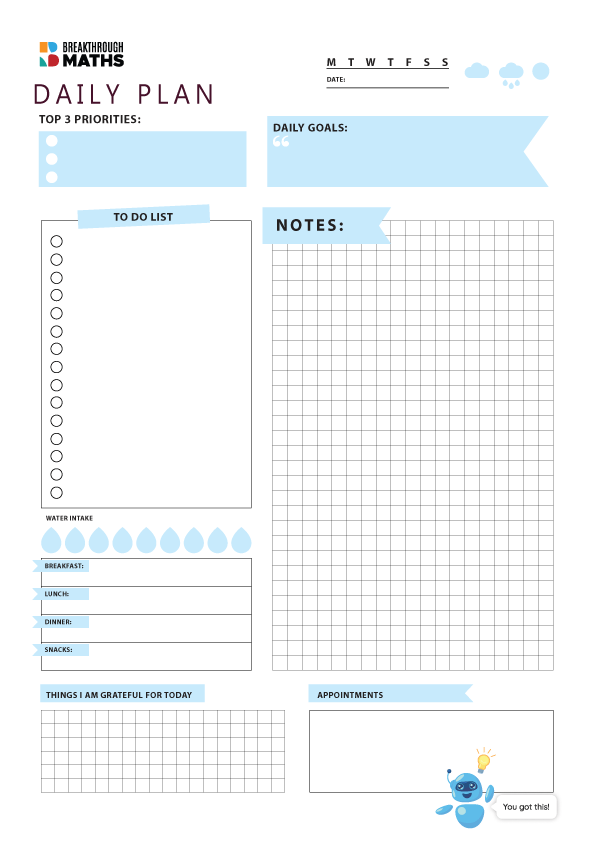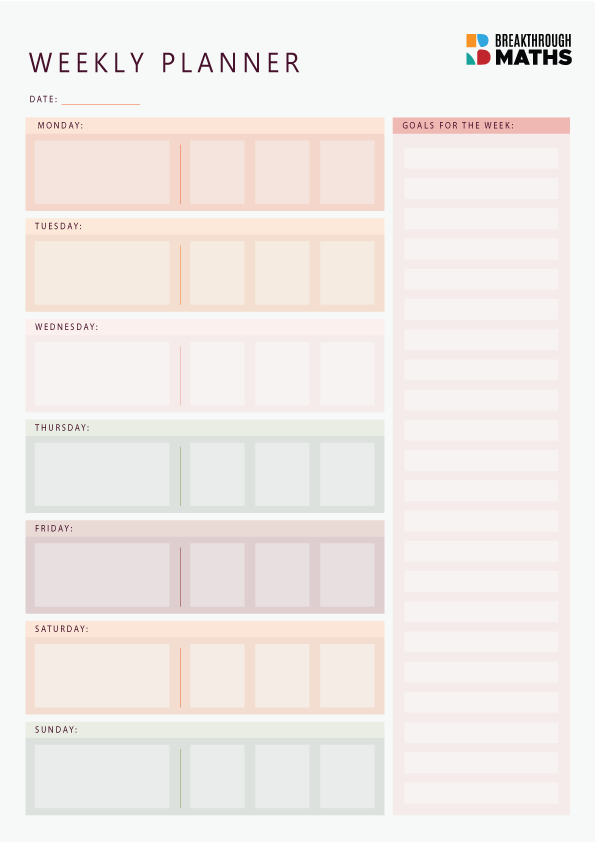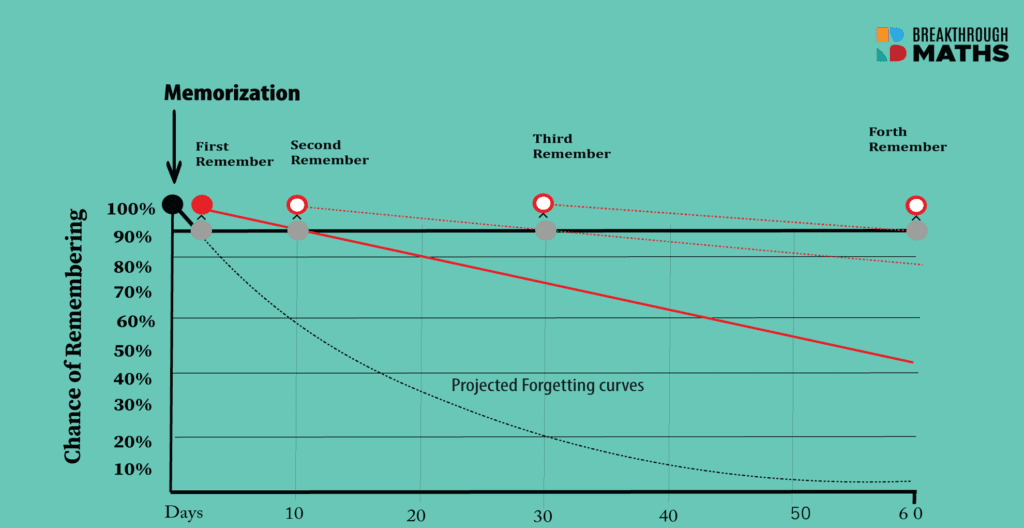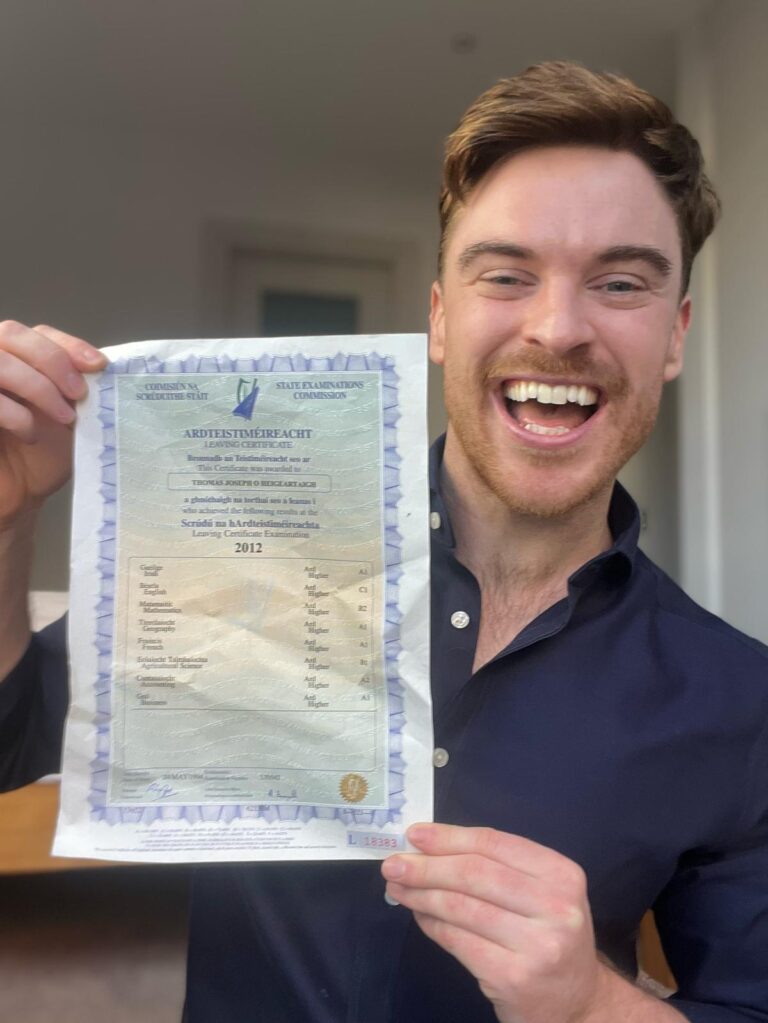WhatsApp:
+353 87 202 0389
Leaving Cert Study Plan Template
In this article, I will help you build your own Leaving Cert Study Plan using proven and scientific strategies and my personal experience, step by step.
The Leaving Certificate (LC) is the final exam for senior students, and all the Irish universities use its result for admission. For many people, it brings back a lot of bad memories!
But how hard will the Leaving Cert be for you?
Well, that depends solely on your preparation. It’s a cliche, but preparation is always the key to success. I have seen many accomplished students start studying for the LC, bit by bit, very early on. I personally started doing a few hours of study on the Sundays in my 5th year – and it paid off in the end!
So how should you prepare for the Leaving Cert?
Every student has different abilities and skills, so there’s no one set method or perfect study guide for the Leaving Cert. Study plans for the Leaving Cert should always be tailored to each student.
That’s why in this article, you’ll learn about the study skills that are essential to get the most from your efforts, such as:
Tips Before You Start Studying For The Leaving Cert
Many students often neglect the “before” of studying and dive straight into multiple study techniques. But properly setting the stage before beginning to study is just as important as the study plan itself. Here are some tips:
1. Set Study Goals
Knowing what you are working towards is everything. Do not skip this task – make sure you know why you are going to study so hard in this Leaving Cert.
I like to work backwards when making these goals. In my Leaving Cert, I identified the course I wanted to study at University. I calculated how many points I needed to achieve for the course and added on an extra 50 points to give myself a margin of safety.
Now you can make individual subject study goals. Begin to ask yourself, what grades do I need to achieve in each individual subject to achieve my overall goal?
Creating Study Goals

An excellent way to make study goals would be to divide them into daily, weekly, and long-term goals. Here’s a general guideline for you:
A. Daily Study Goals
If your classes are still ongoing, then it should hold a to-do list of your unsubmitted assignments, homework, projects, etc. Prepare your daily goals at night after you have finished studying for the day so that you’ll know what needs to be done the following day.
That’s crucial – the last 5 minutes of every day should be spent planning for the next day’s study. That builds habits!
B. Weekly Study Goals
This can be used to give you an overall schedule for the week, a list of approaching tests, and tasks to be achieved over the next seven days. Generally, you might want to complete chapters within this time period.
c. Long Term Study Goals
A term calendar gives you a broad view of your semester and helps you to plan ahead. Use this to mark all assignments, tests, and activities with deadlines to avoid overlooking them by mistake. Generally, you might want to complete subjects by this time.
2. Create Study Goal Templates
When I study I always use study goal templates to organize myself. Here are a few you might follow:
A. Daily Study Template

A. Weekly Study Template

3. Plan When To Study
Some students feel comfortable studying at night; some like to study in the morning. It doesn’t really make a difference Pick a time to study when you have the most energy to concentrate.
Do complex tasks first. Tasks like Higher Level Maths or writing essays require a lot of attention, and your concentration declines as time goes on. So be mindful of that.
Leaving Cert Study Timetable
A study timetable will help you to determine how many hours you should spend daily studying for the Leaving Cert. Here’s what I would recommend for all Leaving Cert subjects (both OL and HL):
The hours will naturally increase as the Leaving Cert exam comes near.
I’d also recommend that senior students should study for 6-8 hours on their weekends. This may seem a lot, but it’ll become much easier to follow if you break up the study periods. Saturdays are always a great day to study. I’d take Sunday mornings off and pick up again on Sunday afternoons.
And here are some extra tips:
- Start with the hardest subject. Study the subject you hate the most at first – get it out of the way.
- Plan study breaks. Plan exercise. These are essential!
- Lay out your books the night before – the last 5 minutes of your studying should always be dedicated to planning the next day’s work!
4. Plan Where To Study
Some students prefer to study in the comfort of their own homes. Some students like to study where they can be held accountable such as libraries, study rooms, study groups, etc.
So figure out where or in which settings you feel the most comfortable studying and have the least distractions.
It is also best to sometimes switch up your usual surroundings to avoid boredom. A change in scenery can improve both your memory and concentration levels, which also helps with active recall performance. So, go to other local libraries, study in different parts of the house, change study groups, etc.
5. Create The Mood
Studying is a habit. The more triggers and routines you develop to initiate the study, the easier it will be to study. A quick workout session or listening to your “study playlist”- simple acts like this can easily make you feel motivated enough.
You need to create the ideal conditions in your body and the external environment to build a consistent study habit. Such as:
A. An Organised Workspace
Decluttering your study table, arranging the notes that you will study that day, gather materials you’ll need to study that particular lesson, like your class notes, slides, references, etc. Get rid of any other distractions from your workspace and focus on one topic at a time.
B. Proper Sleep
Sleeping well plays a crucial part in an effective study.
Research shows that you’ll be more focused, learn faster, and your memory will improve if you get enough rest. In addition, a recent study found a positive relationship between students’ grades and how much sleep they’re getting.
So sleep at least six hours a night. Never pull all-nighters before the Leaving Cert, as research shows the students who pull all-nighters get lower grades and make more careless mistakes.
C. Healthy Snacks
Snacking in between study sessions is a must to get energy but always make sure that they are healthy. Caffeine will help you temporarily, but it will make you sluggish after a while, and you may end up with a blood sugar crash or caffeine hangover.
Try healthy snacks such as dark chocolate, apples, or nuts. Omega-3 fatty acids are critical for brain function- try taking fish oils a couple of months before the exams begin.
You may also eat blueberries rich in flavonoids that strengthen connections in the brain and stimulate the regeneration of brain cells.
D. Increase Your Excercise
The more you exercise, the more effective your study will be.
The benefits of exercise on the brain have been well established. Studies show our brainpower gets a boost following even a short workout, as our bodies are pumping oxygen and nutrients to the brain.
Breaking a sweat shortly before cracking the books will kickstart brain function and help to improve memory and cognitive performance. It will also release endorphins, improving your mood and reducing stress levels.
5 Effective Study Methods For Leaving Cert
Every student is different and learns best in different ways. Some learn using visual methods like pictures and diagrams, whereas others learn by doing/acting out something.
So without knowing what kind of a learner you are, it’s impossible to determine what study methods would be best for you.
The best way to find the most effective study method/methods for you is to try out various well-known techniques, such as the ones listed below:
1. Space Out Your Studying
Spaced practice or “distributed practice” encourages students to study over a longer period instead of cramming the night before. This allows your mind to connect ideas and build upon the knowledge that can be easily recalled later.

To try this technique, you can review your material in spaced intervals similar to the schedule below – taking a poem by WB Yeats as an example:
- Monday: Learn the poem
- Friday: Revisit the poem, recalling what you remember firstly.
- Sunday: Revisit the poem, recalling what you remember firstly.
- 1 week later: Revisit the poem, recalling what you remember firstly.
Even if your exams are months away, this will help you hold yourself accountable.
2. Active Recall
This method argues that rereading textbooks doesn’t help students, and it merely leads the students to think that they know the materials way better than they do because they have the materials right in front of them.
Instead, try active recalling. Close the book and recall an answer to a question without any help. This will help with your long-term memorization. By active recalling, you will remember the information later on more than rereading by active recalling.
Below are some ways you can implement this into your study routine:
- Practice tests: Use practice tests or questions to quiz yourself without looking at your book or notes. The pre-testing effect will also help you get familiarised with the exam pattern.
- Make your own questions: Be your own teacher and create questions you think would be on the test. If you’re in a study group, encourage others to do the same and trade questions.
- Use flashcards: Create flashcards, but make sure to practice your retrieval technique. Instead of flipping a card over prematurely, write the answer down and check.
3. The Feynman Method
Physicist Robert Feynman created this organization-based learning method. Basically, he argues that you can learn any concept quickly by explaining it in plain and simple terms.

If you want to understand something complex, try to explain it in your own words. Thus you will tailor the topic to your understanding and will likely retain it a lot faster.
How it works:
- Write the subject/concept you are studying at the top of a sheet of paper.
- Then, explain it in your own words as if you were teaching a child.
- Review what you wrote and identify any areas where you were wrong. Once you have identified them, go back to your notes or reading material and figure out the correct answer.
- Lastly, if there are any areas in your writing where you used technical terms or complex language, go back and rewrite these sections in simpler terms.
4. Mind Mapping
Some students find that recording all information visually in one place can help paint a fuller picture and aid their learning process.

The structure of a mind map is related to how our brains store and retrieve information. Mind mapping your notes instead of just writing them down can improve your reading comprehension. It also enables you to see the big picture by communicating the hierarchy and relationships between concepts and ideas.
How it works:
- Grab a blank sheet of paper or use a tool online and write your study topic in the centre.
- Connect one of your main ideas, such as a chapter of your book or notes.
- Connect sub-branches of supporting ideas to your main branch. This is the association of ideas and the most critical part.
- Use different colors for each branch and draw pictures if it helps.
5. Study Right Before Sleeping
Studying before you sleep, whether it is reviewing flashcards or notes, any form of studying right before resting can help to improve your active recalling.
When you are awake, you learn new things, and the brain organizes your memories when you are asleep. Your brain refines the information, making it easier to retrieve them and apply them correctly when you need them the most.
So, instead of pulling an all-nighter, study a few hours before bed and then review the information in the morning.
6. Bonus Tips!!
- Always sit at the front. By sitting at the front, you’ll be able to see the board and hear the teacher more clearly, and your concentration will improve too!
- Seek outside help. Some subjects are simply too difficult to learn on your own – professional help can ake all the difference. For example, if you are studying for Leaving Cert Maths, you can join our LC maths grinds for free.
- Break your workload down into manageable chunks. Prioritize and schedule your time realistically!
- Reading out loud can help you to learn faster. When you read information aloud, you both see and hear it, which helps with memorization!
- Test yourself. Solve past Leaving Cert papers and create your questions about the key sections in notes or reading.
- Take short breaks often while studying to avoid mental exhaustion.
Ineffective Study Methods
Many students use various learning techniques that are not suited for them. They cram the topics for a test but forget it a week later because their study techniques never led to long-term learning. These ineffective study techniques include:
1. Overlearning Or Multitasking
Your brain needs time to retain all the information. So do not force yourself to learn everything in one day.
Your brain can also only focus on limited actions at one time. So avoid doing too many things at once or studying from too many sources at once.
2. Making Only Detailed Notes
Instead of fitting every piece of information, make your notes brief by simplifying, summarising, and compressing the information.
Have short notes that include all the LC maths formulas or key plot points of English novels or chronological events in history, etc.
3. Focusing On One Subject Only
Do not study one subject per day – mix it up! Research suggests that it’s more effective to study multiple subjects each day is more effective than zeroing in persistently on one area.
So, spread out your study time for each Leaving Cert subject and study similar subject areas together. This is interleaving practice which is to study a set of related problems, but not all of the same kind.
4. Using Laptops To Study
Research shows that taking notes by hand is more beneficial than taking notes on laptops. When you take notes by hand, you process and reframe that information better than just reading it.
Laptops also create more opportunities for online distractions. So for efficient note-taking, write your notes by hand.
5. Lack Of Study Breaks
It’s very natural to think that you’ll finish all your readings in one sitting or complete all homework without any breaks, but it’s not practical. Research cites that taking regular study breaks is crucial for productivity and improved focus.
It will help you in the long run, so take a 5-10 minutes break for every 30 minutes of work. Take a quick walk or stretch or eat a healthy snack, etc. You can use timers or stopwatches but make sure to avoid using your phone or computer as they can distract you very quickly.
6. Lack of Rewards
Rewards make us engaged in the study process. Getting good grades is a long-term reward, so it’s crucial to reward yourself after every study session. This reward-motivated learning will promote your memory formation and learning ability.
Final Tips For The Leaving Cert
There are so many resources available now to help you study! Starting with the past Leaving Cert exam papers is always the best way forward, and practice those papers regularly and follow all the above-mentioned study techniques.
You should also be mindful of these additional tips to study for the Leaving Cert:
1. Be Updated About The New LC Adjustments
In response to the COVID-19 pandemic, the State Examination Commission (SEC) has made significant adjustments for the Leaving Cert 2022.
2. Get Familiarised With The New LC Grading System
The Department of Education and Skills introduced a new Leaving Certificate grading scale and revised the common points scale in 2017.
Familiar yourself with the new grading system to make the best use of it.
3. Tips For The Night before The Leaving Cert Exams
Many students can be nervous and anxious the day before the exams start. So here are some valuable tips:
- Check the dates and start times to ensure that you don’t miss an exam or arrive late – put the calendar on your wall.
- Ensure you have packed all the necessary equipment to bring to the exam hall, such as multiple writing pens, pencils, scale, scientific calculator, extra face masks, water, analog watch, etc.
- A good night’s sleep is vital to ensure your energy and focus levels. So finish your studying in the early evening and then sleep as early as possible.
- Eat a full breakfast because you will need the fuel to help maintain your focus – porridge, blueberries and some dark chocolate are what I recommend!
- Arrive at your exam centre early to avoid being flustered at the start of your exam.
4. Time Management During The Exam
Time management can be tricky in the Leaving Cert exams for many candidates and so here are some quick tips for you:
- Consider the weighting of marks given to each question and allocate the time accordingly to each question or section. Practice on past exam papers as much as you can at home in that time frame.
- If you get stuck on a question, simply move on.
- Read the exam paper entirely first. Select the questions that you will answer and begin with your strongest area. Leave your least knowledgeable sections to last.
- Pay attention to the questions with the highest marks, and do not waste too much time on lower mark questions.
- Pay attention to the action words in the question. If you are asked to ‘List’, then do exactly that, do not waste time with a paragraph. If you are asked to ‘Explain’ or ‘Describe,’ likewise, spend the time doing that.
Conclusion
Don’t feel overwhelmed, and go and study at your own pace. Gradually implement the techniques into your study sessions and turn them into your habits!
Always remember, although exams like the Leaving Cert are critical for you, they do not define your life, and these exams are for you to cultivate your strengths rather than a pursuit of excellence.
So always follow your gut and be kind to yourself. Good Luck!
It’s all possible — if you put in the work.
T.J – CEO of Breakthrough Maths
Need help in Maths? Contact the Breakthrough Maths team here.





